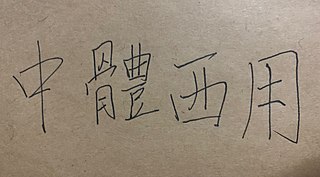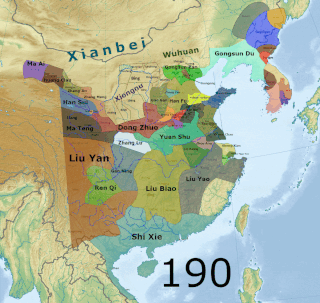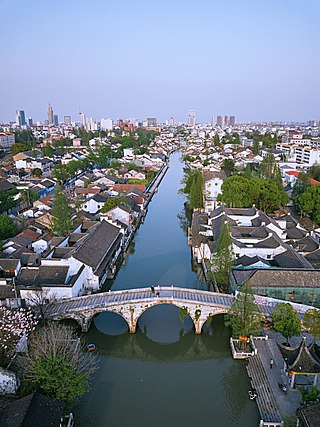
Zhang Zhongjing, formal name Zhang Ji (張機), was a Chinese pharmacologist, physician, inventor, and writer of the Eastern Han dynasty and one of the most eminent Chinese physicians during the later years of the Han dynasty. He established medication principles and summed up the medicinal experience until that time, thus making a considerable contribution to the development of Traditional Chinese Medicine.

Sichuanese or Szechwanese (simplified Chinese: 四川话; traditional Chinese: 四川話; Sichuanese Pinyin: Si4cuan1hua4; pinyin: Sìchuānhuà; Wade–Giles: Szŭ4-ch'uan1-hua4), also called Sichuanese/Szechwanese Mandarin (simplified Chinese: 四川官话; traditional Chinese: 四川官話; pinyin: Sìchuān Guānhuà), is a branch of Southwestern Mandarin spoken mainly in Sichuan and Chongqing, which was part of Sichuan Province until 1997, and the adjacent regions of their neighboring provinces, such as Hubei, Guizhou, Yunnan, Hunan and Shaanxi. Although "Sichuanese" is often synonymous with the Chengdu-Chongqing dialect, there is still a great amount of diversity among the Sichuanese dialects, some of which are mutually unintelligible with each other. In addition, because Sichuanese is the lingua franca in Sichuan, Chongqing and part of Tibet, it is also used by many Tibetan, Yi, Qiang and other ethnic minority groups as a second language.

Wenshu Guangfa Tianzun is a Taoist deity and character in the classic Chinese novel Investiture of the Gods. He is a disciple of Yuanshi Tianzun and one of the Three Great Immortals, holding the fifth position among the Twelve Golden Immortals.
Qingxu Daode Zhenju is a character featured within the famed classic Chinese novel Investiture of the Gods. He is one of the Twelve Golden Immortals under Yuanshi Tianzun. He has two disciples: Huang Tianhua and Yang Ren, and the servant is Baiyun Boy. He once rescued Huang Feihu, defeated the Red Water Formation, killed its leader Wang Biantianjun, and contributed to King Wu's victory over King Zhou. His only defeat came at the hands of Sanxiao Niangniang's Hunyuan Golden Fight.

Mile is a county-level city located in Honghe Hani and Yi Autonomous Prefecture, Yunnan province, China. It is named after the Maitreya Buddha, for which there was a temple located on a nearby mountain, making it the only city in China named after The Buddha. It is a center for sugar and tobacco production in Yunnan.
Empress Yuan, personal name unknown, was briefly an emperor of the Xianbei-led Chinese Northern Wei dynasty. She bore the surname Yuan, originally Tuoba. Yuan was the only child of Emperor Xiaoming, born to his concubine Consort Pan. Soon after her birth, her grandmother the Empress Dowager Hu, who was also Xiaoming's regent, falsely declared that she was a boy and ordered a general pardon. Emperor Xiaoming died soon afterwards. On 1 April 528, Empress Dowager Hu installed the infant on the throne for a matter of hours before replacing her with Yuan Zhao the next day. Emperor Xiaoming's daughter was not recognised as a legitimate emperor (huangdi) by later generations. No further information about her or her mother is available.

Leung Man-tao is a Hong Kong writer, critic and host.
I Lo-fen is a Taiwanese scholar and writer. She received her Chinese Literature Ph.D. from National Taiwan University. She has been an associate professor in the Division of Chinese in Nanyang Technological University’s School of Humanities and Social Sciences since July 2006, and was the Head of the Division (2014-2016). She had formerly committed in institutes like the National Taiwan University, Tamkang University, Fu Jen Catholic University, and the Institute of Chinese Literature and Philosophy at Academia Sinica. In addition, she was also a visiting professor at Stanford University in the United States and East Asian Institute at Sungkyunkwan University, South Korea. Her research expertise lies in Text and Image Studies, Su Shi studies, East Asian literature and intercultural exchanges in Classical Chinese, and Singapore literature, history, and arts studies. She is also a board member of the China Su Shi Studies Society, and an international board member of the Korea Society of East Asian Comparative Literature. She is the Founder and Honorary President of the "Text and Image Studies Society"(文图学会) that was official registered in Singapore on 18 December 2017. By integrating the history of Chinese literature and arts, she has accomplished a series of researches on poems in paintings and poetic imagery. She then proposed the idea of the “Text and Image Studies”(文图学) and focused on the relations, comparison and intertextuality between poems and paintings. From there, she has established her literary theory in arts creation and culture of aesthetics. She is also a column writer of Singapore Lianhe Zaobao (2007-), and she hosts podcast "Lofen says".
Wu Bing'an was a Chinese ethnologist and an expert on folklore and popular culture. He was a professor of Liaoning University and served as President of the Chinese Folklore Society.
Song Ruozhao was a Chinese Confucian scholar, poet and imperial official of the Tang dynasty (618–906). Her extant works include one poem, a short fiction story and her annotation to her sister's work: Analects for Women, a book about the proper roles and code of conduct for women, and a biography of Niu Yingzhen.

The idea of "Chinese Learning as Substance, Western Learning for Application" was initially proposed by Feng Guifen in his Xiaopinlu kangyi, written in 1861 after the Second Opium War. At the time, leading Chinese thinkers were interrogating how to approach the threat posed by encroaching Western states. Feng argued for China's self-strengthening and industrialization by borrowing Western technology and military systems, while retaining core Neo-Confucian principles. These ideas were further elaborated on by Zhang Zhidong in 1898 in his book Quanxue pian as "Traditional (Chinese) learning as substance, New (Western) learning as application" (“舊學為體,新學為用”). “Zhongti xiyong” became a popular slogan used in the late Qing Reforms, including the Self-Strengthening Movement and Hundred Days' Reform. The concept was widespread among intellectuals in the late 19th and early 20th century, and it remains relevant in the modern studies of China-West cultural relationship.
Gongxingdun Airport also called Lanzhou Donggang Airport (兰州东岗机场) was an airport in Gongxingdun township, Chengguan District, Lanzhou, Gansu, China. It was the primary airport of Lanzhou from the 1930s to 1970.

Yan was a Chinese kingdom that existed from July 237 to September 238 CE in the Liaodong Peninsula during the Three Kingdoms period. Its predecessor was an independent regime ruled by Gongsun Du and his son Gongsun Kang from 190 to 237. Though it only claimed independence in 237, historians such as Wang Zhongshu and Hou Tao consider it to be a de facto independent regime from when Gongsun Du established his rule in Liaodong in 190. Although it existed during the Three Kingdoms period, it is not counted as one of the eponymous three kingdoms: Cao Wei, Shu Han, and Eastern Wu. Nevertheless, writers such as Kang Youwei consider it to be a "fourth country".
Ankou is a town of Huating County, Pingliang City, Gansu, China. The town is highly industrialized.
Changqingqiao is a town of Ningxian, Pingliang, Gansu, China. It is located in the southwest corner of Ningxian on the north bank of the Jing river.
Ningling Ge was a crown prince of the Western Xia dynasty and the fourth son of the Emperor Jingzong, the founding monarch. Ningling Ge was a member of Tangut Weiming (嵬名) clan.

The Dacang Bridge is a historic stone arch bridge over the Old City River in Songjiang District of Shanghai, China.







